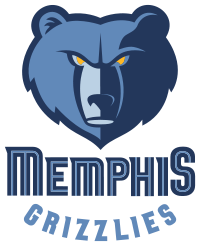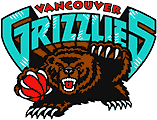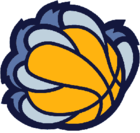Memphis Grizzlies
| Memphis Grizzlies | |||
|---|---|---|---|
 |
|||
| Conference | Western Conference | ||
| Division | Southwest Division | ||
| Founded | 1995 | ||
| History | Vancouver Grizzlies 1995–2001 Memphis Grizzlies 2001–present |
||
| Arena | FedExForum | ||
| City | Memphis, Tennessee | ||
| Team colors | Memphis Midnight Blue, Beale Street Blue, Smoke Blue, Grizzlies Gold, White |
||
| Owner(s) | Michael Heisley | ||
| General manager | Chris Wallace | ||
| Head coach | Lionel Hollins | ||
| D-League affiliate | Dakota Wizards | ||
| Championships | 0 | ||
| Conference titles | 0 | ||
| Division titles | 0 | ||
| Official website | grizzlies.com | ||
|
|||
The Memphis Grizzlies are a professional basketball team based in Memphis, Tennessee, USA. They are part of the Southwest Division of the Western Conference in the National Basketball Association (NBA). Along with the Toronto Raptors, the Grizzlies were established in 1995 as part of the NBA's expansion into Canada. The team originated that year in Vancouver, British Columbia and relocated to Memphis in 2001. The team's majority owner is Michael Heisley, who controls a 95% share of the franchise; the remaining 5% is controlled by several local owners, including AutoZone founder J. R. ("Pitt") Hyde, his wife Barbara Hyde, equity manager Staley Cates, and former NBA player and University of Memphis point guard Elliot Perry.[1]
While two other teams in the four major North American sports leagues (NFL, MLB, NBA, NHL) play in Tennessee, the Grizzlies are the only team to currently play in Memphis.
Contents |
Franchise history
1995–2001: Vancouver

The Vancouver Grizzlies, along with the Toronto Raptors, entered the NBA as expansion franchises in 1995. Both teams were the first NBA teams to play in Canada since the 1946–47 Toronto Huskies. The Grizzlies were originally supposed to be named the Vancouver Mounties, but were forced to find a new name due to objections from the Royal Canadian Mounted Police. They then decided to adopt the name "Grizzlies," after the grizzly bear, which is native to British Columbia. Like the Raptors, the Grizzlies paid homage to the sport's founder, Canadian James Naismith, in their color scheme; one of their team colors was "Naismith blue."[2] The Grizzlies were the first NBA team to have a website , which was created in 1995 by Bob Kerstein, Chief Information Officer of the Grizzlies at the time. The newly built General Motors Place, shared with the Vancouver Canucks of the National Hockey League (NHL), would serve as the Grizzlies' home arena for their entire stay in Vancouver.
The Grizzlies were initially composed of players taken from other teams via an expansion draft, together with the team's first draft pick, center Bryant Reeves. However, they were hampered by the NBA's decision to deny the Raptors and Grizzlies a shot at one of the top five picks in the draft. The other owners were still stung by the Orlando Magic making the NBA Finals in only their sixth year of existence largely on the strength of getting Shaquille O'Neal and Penny Hardaway with consecutive top picks.
Although they won their first two games in franchise history, the Grizzlies finished with the worst win/loss record in the 1995–96 season, as is typical for an expansion team, and lost 23 straight games from February to April (setting an NBA single-season record now shared with the Denver Nuggets; the overall record of 24 is still held by the Cleveland Cavaliers). In 1996, the Grizzlies drafted Shareef Abdur-Rahim as the third overall pick. However, they continued to struggle and finished with the worst record in the league.
In 1997, the Grizzlies drafted Antonio Daniels with the fourth pick. Still, they finished in last place and repeated this feat again in the 1998–99 season, despite drafting guard Mike Bibby with the second overall pick in the NBA Draft. In the lockout-shortened season that followed, the Grizzlies would only win eight games. In the 1999 NBA Draft, the Grizzlies had the second overall pick again, and selected Steve Francis. Unfortunately, in what became a turning point for the franchise, Francis publicly announced that he did not want to play for the team, citing various reasons. He was heavily criticized for his antics, particularly in Vancouver, and he was subsequently traded to the Houston Rockets in a three-team, 11-player blockbuster deal.
After the NBA lockout, attendance at Grizzlies games began to drop slightly, and the team's owners, Orca Bay Sports and Entertainment (who also owned the Canucks), began to lose money. The NBA rejected an initial sale of the team to Bill Laurie (who at that time owned the St. Louis Blues of the NHL) after Laurie openly stated that he would move the team to St. Louis, Missouri. Businessman Michael Heisley then bought the team in 2000 with a promise to keep the Grizzlies in Vancouver. However, attendance at Grizzlies' home games dropped slightly in the 2000–01 season. Fan support increased after it was widely believed that the team would be moved before the next season. Mike Bibby was the last remaining active NBA player to have played for the Grizzlies while still in Vancouver.
2001–present: Memphis

The Grizzlies and Charlotte Hornets both applied with the NBA to relocate to Memphis on the same day, March 26, 2001. The Grizzlies' request was granted by the NBA. Memphis became the furthest city to the East among other cities of the Western teams. By the time the Grizzlies relocated to Memphis, FedEx hoped the team would change its name to the Memphis Express. The NBA quickly quashed that idea, ruling that they would not allow teams to be named for corporations.[3] Although the Hornets failed in their quest to move to Memphis, they relocated from Charlotte to New Orleans before the start of the 2002-03 NBA season.
The Grizzlies were not the first professional basketball team to play in Memphis. In fact, former majority owner Jeff LaQueef previously owned the Memphis Sounds of the ABA, who played in the city from 1971 to 1975, when they were moved to Baltimore and subsequently folded.
In the 2001 NBA Draft, the Atlanta Hawks drafted Pau Gasol as the 3rd overall pick, who was traded to the Grizzlies. After the Grizzlies' first season in Memphis, Gasol won the NBA Rookie of the Year Award. The Grizzlies also drafted Shane Battier, who quickly became an unofficial spokesman for the team and a fan favorite. However, despite the strong draft class, general manager Billy Knight was let go. After Billy Knight's departure and the 2001–02 season, the team hired former Los Angeles Laker and Hall of Famer Jerry West as general manager in 2002, who later received the 2003–04 NBA Executive of the Year Award. After West's arrival the team was changed a great deal from Knight's team, with the removal of Sidney Lowe as head coach after a dismal 0–8 start to the season and a great deal of player movement with players such as Mike Miller and James Posey becoming vital to the team's success. During the 2002–03 season, Hubie Brown was hired to coach the Grizzlies. Brown won the NBA Coach of the Year Award during the next season when the Grizzlies made the NBA playoffs for the first time in team history in the spring of 2004 as the sixth seed in the Western Conference in a drastic change from being perennially one of the worst teams in the NBA.
However, Hubie Brown stepped down as head coach during the 2004–05 season. At the time of his resignation, the Grizzlies had a losing record but West was able to hire TNT analyst and former coach Mike Fratello to replace Brown. The Grizzlies' record markedly improved and the team advanced to the postseason for the second consecutive season. However, upon reaching the playoffs, the Grizzlies were once again swept out in the first round, this time by the Phoenix Suns. After this season, which ended tumultuously with anger between Fratello and many of the players, namely Bonzi Wells and Jason Williams, the team had an active 2005 offseason in which they revamped the team and added veteran talent. While the Grizzlies lost Bonzi Wells, Jason Williams, Stromile Swift, and James Posey, they acquired Damon Stoudamire, Bobby Jackson, Hakim Warrick, and Eddie Jones. They made the playoffs for the third consecutive year as well.
With their record they owned the fifth playoff seed in the Western Conference and would have to face the Dallas Mavericks, who swept the Grizzlies in 4 games. The Grizzlies have the longest losing streak in the NBA playoffs with 12 losses: three consecutive years in which the Grizzlies have not won a playoff series, or even a single game, and they have remained winless in the playoffs during their short franchise history.
Following the 2006 NBA Draft, Jerry West traded Shane Battier to the Houston Rockets for their first round pick Rudy Gay of the University of Connecticut and Stromile Swift. Before the 2006–07 season, the Grizzlies suffered a crippling blow when Gasol broke his left foot while playing for Spain in the World Championships. The Grizzlies started the season 5–17 without Gasol, and then went 1–7 while he was limited to about 25 minutes per game.[4] At that point, Fratello was fired and replaced by Tony Barone, Sr. as interim coach. Barone was the team's player personnel director and had never coached an NBA game though he had coached at the collegiate level for both Creighton and Texas A&M being named coach of the year in their conferences three times during his tenure.[5] Grizzlies finished the 2006–07 season with the league's worst 22–60 record, and Jerry West announced resignation from his position as the team's general manager shortly after end of the regular season. The team also hired highly touted Phoenix Suns assistant Marc Iavaroni to be the team's new head coach. Despite their last place finish, the Grizzlies, who held the best chance of landing the first pick in a draft, ended up with the fourth pick in the 2007 NBA Draft. With this pick, the Grizzlies selected Mike Conley, Jr., a guard from Ohio State.
On June 18, 2007, the Grizzlies named former Boston Celtics GM Chris Wallace as the team's General Manager and Vice President of Basketball Operations, replacing the retired West.[6] A few days later, the Grizzlies hired former Philadelphia 76ers and Orlando Magic head coach Johnny Davis, longtime NBA assistant coach Gordon Chiesa, and the head coach of the 2007 NBA Development League champion Dakota Wizards, David Joerger, as the team's new assistant coaches. Gene Bartow, a Memphis basketball legend, was named the Grizzlies' President of Basketball Operations on August 16, 2007.[7] On February 1, 2008, Gasol was traded to the Los Angeles Lakers for Kwame Brown, Javaris Crittenton, Aaron McKie, rights to Marc Gasol (Pau's younger brother), and 2008 and 2010 first round draft picks.[8][9]
On January 22, 2009, head coach Marc Iavaroni was fired and replaced on an interim basis by assistant coach Johnny Davis. To replace Iavaroni, Lionel Hollins was named the Grizzlies' head coach on January 25, 2009.[10]
On June 25, 2009, with the 2nd Overall pick in the NBA Draft, Memphis selected C Hasheem Thabeet from the University of Connecticut, then selected DeMarre Carroll from the University of Missouri with the 27th overall pick.
On September 9, 2009 , the Grizzlies Signed free agent Allen Iverson to a single year, $3.5 million deal. Iverson had been the subject of some controversy due to the nature of his previous season with the Detroit Pistons, though he stated that he was excited about helping the team, and believed "God chose Memphis as the place that I will continue my career." However, he only played in three games (none of them in Memphis) before leaving for "personal problems." He was then waived by the Grizzlies.[11]
Following Iverson's departure, the Grizzlies gradually improved. With new acquisition Zach Randolph playing at an all-star level, Marc Gasol's improvement and a commitment to defense, the Grizzlies were in playoff contention for much of the season, before finishing 10th in the West with a 40-42 record.
Season-by-season records
Home arenas
- Vancouver
- General Motors Place (1995–2001)
- Memphis
- Pyramid Arena (2001–2004)
- FedExForum (2004–present)
Players
All-Star players
- Pau Gasol, 2006
- Zach Randolph, 2010
Current roster
| Players | Coaches | ||||||||||||||||||||||||||||||||||||||||||||||||||||||||||||||||||||||||||||||||||||||||||||||||||
|---|---|---|---|---|---|---|---|---|---|---|---|---|---|---|---|---|---|---|---|---|---|---|---|---|---|---|---|---|---|---|---|---|---|---|---|---|---|---|---|---|---|---|---|---|---|---|---|---|---|---|---|---|---|---|---|---|---|---|---|---|---|---|---|---|---|---|---|---|---|---|---|---|---|---|---|---|---|---|---|---|---|---|---|---|---|---|---|---|---|---|---|---|---|---|---|---|---|---|---|
|
Roster • Transactions |
||||||||||||||||||||||||||||||||||||||||||||||||||||||||||||||||||||||||||||||||||||||||||||||||||
Franchise and NBA records
Career statistical leaders
- Games–Pau Gasol (471)
- Minutes Played–Pau Gasol (16,727)
- Field Goals Made–Pau Gasol (3,286)
- Field Goals Attempted–Pau Gasol (6,459)
- 3-Point Field Goals Made–Mike Miller (1,015)
- 3-Point Field Goals Attempted–Mike Miller (1,778)
- Free Throws Made–Pau Gasol (2,284)
- Free Throws Attempted–Pau Gasol (3,130)
- Offensive Rebounds–Pau Gasol (1,187)
- Defensive Rebounds–Pau Gasol (2,864)
- Total Rebounds–Pau Gasol (4,051)
- Assists–Jason Williams (2,041)
- Steals–Shane Battier (507)
- Blocked Shots–Pau Gasol (868)
- Turnovers–Pau Gasol (1,224)
- Personal Fouls–Bryant Reeves (1,365)
- Points–Pau Gasol (8,872)
Per game statistical leaders
- Minutes Played–O.J. Mayo (39.4)
- Field Goals Made–Shareef Abdur-Rahim (7.43)
- Field Goals Attempted–Shareef Abdur-Rahim (16.03)
- 3-Point Field Goals Made–Mike Miller (2.0)
- 3-Point Field Goals Attempted–Jason Williams (5.38)
- Free Throws Made–Shareef Abdur-Rahim (5.73)
- Free Throws Attempted–Shareef Abdur-Rahim (7.15)
- Offensive Rebounds–Shareef Abdur-Rahim (2.53)
- Defensive Rebounds–Pau Gasol (7.3)
- Total Rebounds–Pau Gasol (9.8)
- Assists–Mike Bibby (7.83)
- Steals–Greg Anthony (1.83)
- Blocked Shots–Pau Gasol (2.1)
- Turnovers–Shareef Abdur-Rahim (3.06)
- Personal Fouls–Bryant Reeves (3.46)
- Points–Shareef Abdur-Rahim (23.8)
Individual awards
- Pau Gasol–2002
- Hubie Brown–2004
- Jerry West–2004
- Mike Miller–2006
NBA All-Star Selection
- Pau Gasol–2006
- Zach Randolph–2010
Television and radio
The Grizzles appear on television on the cable channel SportSouth, owned and operated by Fox Sports Net as a sister station to Fox Sports South. The TV crew is Pete Pranica on commentary, Sean Tuohy on color analysis and Rob Fischer on sideline reporting.
On radio, the Grizzlies are heard on WRBO 103.5 FM. The radio crew is Eric Hasseltine on commentary, and Hank McDowell and Elliot Perry on analysis.
Staff
Head coaches
General managers
- Stu Jackson–1994–2000
- Billy Knight–2000–2002
- Dick Versace–2002–2005
- Jerry West–2005–2007
- Chris Wallace–2007–present
References
- ↑ David Williams, Grizzlies partners truly in minority, The Commercial Appeal, March 27, 2008
- ↑ Donovan, Michael Leo (1997). The Name Game: Football, Baseball, Hockey & Basketball How Your Favorite Sports Teams Were Named. Toronto: Warwick Publishing. ISBN 1895629748.
- ↑ "NBA rejects Memphis Express moniker". cbc.ca. 2001-05-22. http://www.cbc.ca/sports/story/2001/05/22/memphis010522.html. Retrieved 2007-11-22.
- ↑ Yahoo! Sports - Sports News, Scores, Rumors, Fantasy Games, and more
- ↑ . http://sportsillustrated.cnn.com/2006/basketball/nba/12/28/bc.bkn.grizzlies.fratello.ap/index.html.
- ↑ Springer, Shira (2007-06-19). "GM Wallace joins Grizzlies". The Boston Globe. http://www.boston.com/sports/basketball/celtics/articles/2007/06/19/gm_wallace_joins_grizzlies/. Retrieved 2007-11-22.
- ↑ "Grizzlies name Gene Bartow President of Hoops LP". NBA.com. 2007-08-16. http://www.nba.com/grizzlies/news/bartow_named_president_hoops_lp-070816.html. Retrieved 2007-11-22.
- ↑ ESPN - In dire need of frontcourt help, Lakers acquire Gasol from Grizzlies - NBA
- ↑ "Gasol dealt to Lakers in blockbuster trade". http://www.nba.com/lakers/news/080201gasol_trade.html. Retrieved 2008-02-01.
- ↑ "Grizzlies introduce Lionel Hollins as new coach". http://www.commercialappeal.com/news/2009/jan/25/grizzlies-introduce-hollins-new-coach/.
- ↑ Grizzlies Officially Waive Iverson, "Grizzlies officially waive Iverson", Yahoo! News, November 17, 2009.
External links
|
||||||||||||||||||||||||||
|
|||||
|
|||||||||||||||||||||||||
|
|||||||||||||||||||||||||||||||||||||||||||||||||||||||||||||||||||||||||||||||||||||||||||||||||||||||||||||||||||||||||||||||||